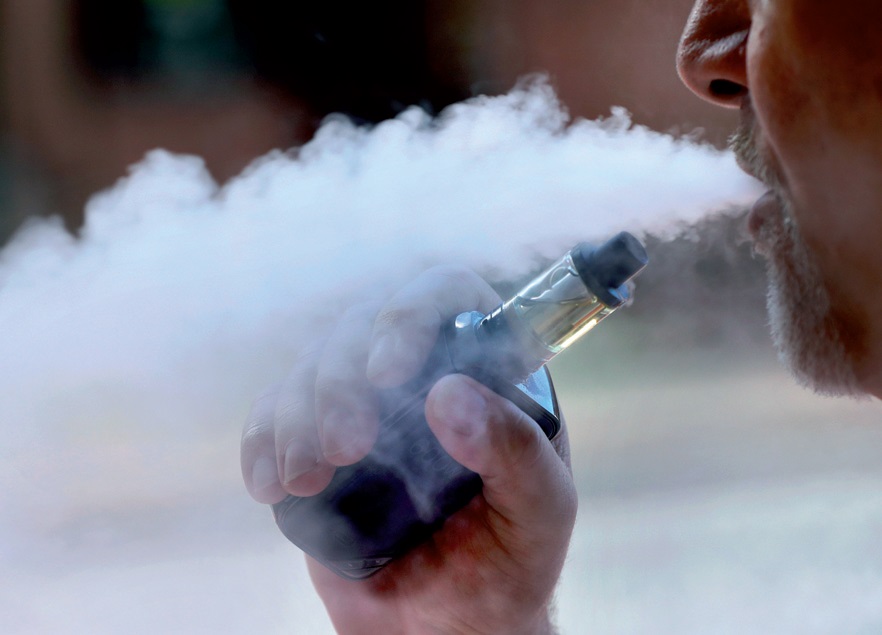Michigan first state to ban flavored e-cigs


Aug 28. [Photo/Agencies]
Michigan on Wednesday became the first US state to ban flavored e-cigarettes as more than 200 people in at least 25 states have come down with a lung illness that appears to be linked to e-cigarettes and has caused two deaths.
Governor Gretchen Whitmer ordered the Michigan Department of Health and Human Services to issue emergency rules banning the sale of sweet, fruity and menthol e-cigarettes, which studies say are more likely to get young people hooked on vaping.
The rules ban vaping products in retail stores and online. They will also prohibit "misleading marketing" of vapor products using terms like "clean," "safe" and "healthy", the state said.
The emergency rules will go into effect immediately and will last for six months but can be renewed as officials develop permanent regulations.
Michigan's ban comes after the Michigan Department of Health and Human Services (MDHHS) said that youth vaping constitutes a public health emergency for the state, and after the state reported last week that it is investigating six cases of severe respiratory illnesses linked to vaping.
On Tuesday, Oregon health officials said that a middle-age Oregonian died in July from a severe respiratory illness after using an e-cigarette vaping device that burned cannabis.
On Friday, the Illinois Department of Public Health reported the first known death from the illness. It said an adult hospitalized with severe respiratory illness after vaping died in August. The department didn't give details on the patient or the exact circumstances of their death.
Last week, the Centers for Disease Control and Prevention (CDC) reported that there were 215 cases of severe respiratory disease in 25 states since late June. All patients are teenagers or young adults. Health officials said they believe their illnesses are associated with vaping, but they haven't been able to single out which ingredient or device may be causing the problem.
NBC News reported Wednesday that its survey of state health departments has revealed at least 329 confirmed or possible cases.
The CDC said that "many patients have reported using e-cigarettes containing cannabinoid products such as THC or CBD", and it warned teenagers and other consumers to stop buying bootleg and street cannabis and e-cigarette products, and to stop modifying devices to vape adulterated substances.
Symptoms of the vaping-related lung disease include difficulty breathing, shortness of breath and chest pain, health officials said. Fatigue, diarrhea and vomiting also have been reported.
"As governor, my number one priority is keeping our kids safe," Whitmer, a Democrat, said in a statement. "And right now, companies selling vaping products are using candy flavors to hook children on nicotine and misleading claims to promote the belief that these products are safe. That ends today."
The American Vaping Association, which promotes e-cigarettes as a way to help smokers quit traditional cigarettes, said it would support lawsuits challenging the ban.
Association President Greg Conley called Whitmer's move a "shameless attempt at backdoor prohibition''. He said it will "close down several hundred Michigan small businesses and could send tens of thousands of ex-smokers back to deadly combustible cigarettes".
"No other state has done something like this by rule-making, probably because lawyers will tell most governors that, 'Hey, you're not a king or queen,'" Conley told The Detroit News.
In June, San Francisco – where leading e-cigarette maker Juul Labs is headquartered — became the first major US city to ban e-cigarette sales. The ban includes sales in brick-and-mortar stores, as well as online sales shipped to a San Francisco address. The ordinance also applies to flavored tobacco products in addition to e-cigarettes. The measure doesn't ban the use of vapes among people 21 and older.
In Michigan, the ban comes not by executive order from Whitmer, but through Michigan's administrative rules process, which allows state agencies to create regulations or policies that, once authorized, act as laws.
The vaping ban rule hasn't yet been filed but will be effective immediately once complete in a few weeks, Whitmer's spokesperson said. Then the ban will last six months and will give Michigan businesses 30 days to comply.
Michigan officials said they will develop permanent regulations banning flavored e-cigarettes. The state Legislature could try to block those rules, but such legislation would face a veto, they said.
In 2018, the Food and Drug Administration (FDA) said 3.62 million middle and high school students reported using e-cigarettes in 2018. The FDA noted a 78 percent increase among high school students from 2017, and a 48 percent increase among middle schoolers.
A 2013-2014 survey on e-cigarette use found that 81 percent of young e-cigarette users said the appealing flavor options were a major reason for their use.
Kevin Burns, CEO of Juul Labs, maker of the blockbuster e-cigarette device blamed by many for the surge in teenage vaping, said in a recent television interview that he didn't know of evidence linking the recent illnesses to Juul's products.
In a statement given to China Daily on Wednesday, Juul said it hasn't yet reviewed the Michigan decision, but "we believe that strong and serious actions need to be taken around certain flavored products, which is why we already stopped selling our non-tobacco/non-menthol based JUULpods to traditional retail stores''.
The company said it's "aggressively fighting against counterfeit and compatible flavored products which can appeal to youth and can be made with unknown ingredients, under unknown quality and manufacturing standards''.
The Associated Press contributed to this story.

































